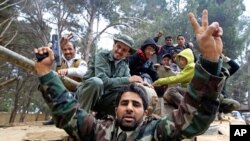Libyan leader Moammar Gadhafi has blamed Osama bin Laden and al-Qaida terrorists for the anti-government protests in his country.
In a Thursday speech relayed to state television by telephone, he said al-Qaida forces had given "hallucinogenic" drugs to youth in Libya to get them to incite unrest. He said people "with any brains" would not take part in the demonstrations. He urged parents to "control" their children and keep them at home.
Independent news reports, however, do not link al-Qaida to the uprising.
Mr. Gadhafi also expressed his condolences for those killed in the unrest in what was his second national address since the protests erupted. And, he said he had become a "symbolic" leader who had no authority to impose rules on Libyans.
The speech came as violence continued between fighters loyal to Mr. Gadhafi and anti-government forces pushing for him to give up power.
Witnesses say the fighting Thursday took place about 200 kilometers east of the capital, Tripoli, in the city of Misrata, where anti-government forces on Wednesday claimed to have taken control of the country's third largest city.
Another clash broke out Thursday just west of the capital in the city of Zawiya. A witness told a reporter for The Associated Press that Gadhafi loyalist forces blasted the minaret of a mosque where protesters were taking refuge.
Mr. Gadhafi's son Saif al-Islam Gadhafi claimed Thursday that the number of people killed by government crackdowns on protesters has been exaggerated.
The overall death toll has been impossible to determine. Human rights groups say they have confirmed about 300 deaths. Witnesses suggest the number is far larger, and Italian Foreign Minister Franco Frattini said Wednesday more than 1,000 people have likely been killed in Libya's week-long uprising.
Slide show of latest situation in Libya
Thursday's fighting came as anti-government forces consolidated control over key eastern cities, and vowed to "liberate" Tripoli.
Protest organizers in the capital, which is Mr. Gadhafi's stronghold, called for new rallies Friday, raising the potential for a new confrontation there.
Armed militiamen and pro-Gadhafi loyalists - a mix of Libyans and African mercenaries - are reportedly roaming through Tripoli and fortifying the city's outer defenses. Security agents are said to be searching for people considered disloyal to the regime.
The U.S. State Department says senior Libyan officials told U.S. diplomats that some members of the media will be allowed into the country to report on the situation. But these same officials said that some reporters have entered Libya illegally and that the government considers these reporters al-Qaida collaborators.
Protesters and mutinous army units are said to be consolidating their hold on nearly the entire eastern half of Libya's 1,600 kilometer-long coastline, setting up rudimentary governments and manning checkpoints along the main roads.
In the eastern city of Benghazi, the cradle of the revolt against Mr. Gadhafi, rebels and supporters thronged the streets waving red, green and black monarchy-era flags and handing out food to passing cars. Benghazi residents also formed units to collect weapons and protect property.
In the eastern city of Baida, police stations, intelligence buildings and other installations representing Mr. Gadhafi's rule stood in ruins as people celebrated in the street. A VOA correspondent at the Egyptian border with Libya says "well-armed men" celebrating their control of the region were chanting and waving the country's pre-Gadhafi-era flag.
The disintegration of Libya's government has added to the relative power of Libya's many tribes, each claiming the loyalty of thousands of members. Colonel Gadhafi's tribe, the Gadhafa, dominates parts of the armed forces. The Warfalla - cut out of the power structure since members allegedly attempted to overturn the regime in 1993 - have backed the eastern rebellion.
Mr. Gadhafi took power in a 1969 coup.
Some information for this report was provided by AP, AFP and Reuters.




